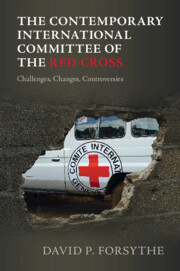Book contents
- The Contemporary International Committee of the Red Cross
- The Contemporary International Committee of the Red Cross
- Copyright page
- Dedication
- Contents
- Photographs
- Preface: Who and Why
- 1 The Contemporary ICRC and Its Critics
- 2 The ICRC and the Global Humanitarian System
- 3 History
- 4 History
- 5 The Red Cross Movement
- 6 The Red Cross Movement
- 7 ICRC Relations with Bern
- 8 ICRC Relations with Bern
- 9 Humanitarians and Business
- 10 Humanitarians and Business
- 11 Interpreting the Mandate
- 12 Interpreting the Mandate
- 13 Has the Traditional Focus Been Lost?
- 14 Has the Traditional Focus Been Lost?
- 15 ICRC Governance and Management
- 16 ICRC Governance and Management
- 17 Conclusion
- 18 Conclusion
- Epilogue
- Annex
- Index
10 - Humanitarians and Business
Part II – The World Economic Forum
Published online by Cambridge University Press: 01 February 2024
- The Contemporary International Committee of the Red Cross
- The Contemporary International Committee of the Red Cross
- Copyright page
- Dedication
- Contents
- Photographs
- Preface: Who and Why
- 1 The Contemporary ICRC and Its Critics
- 2 The ICRC and the Global Humanitarian System
- 3 History
- 4 History
- 5 The Red Cross Movement
- 6 The Red Cross Movement
- 7 ICRC Relations with Bern
- 8 ICRC Relations with Bern
- 9 Humanitarians and Business
- 10 Humanitarians and Business
- 11 Interpreting the Mandate
- 12 Interpreting the Mandate
- 13 Has the Traditional Focus Been Lost?
- 14 Has the Traditional Focus Been Lost?
- 15 ICRC Governance and Management
- 16 ICRC Governance and Management
- 17 Conclusion
- 18 Conclusion
- Epilogue
- Annex
- Index
Summary
The increased but perhaps temporary tight linkage between the ICRC and the World Economic Forum, whose paying members are corporations, is examined in great detail – especially from 2014. A costs–benefits analysis, fairly constructed, shows that the issue is of relatively minor significance in the long run as facts have played out, although that could have been otherwise. The world overwhelmingly has adopted some form of capitalism, which recognizes the importance of private business actors, including in places such as “communist” China and Vietnam. But President Peter Maurer’s presence on the WEF board of trustees was indeed a mistake. The ICRC, existing for strictly humanitarian reasons, should not be endorsing or advancing any economic system, or allowing itself to be seen as part of an unelected economic elite that informally helps govern a world manifesting many negatives. The problem 2014–2022 was mainly one of optics: namely, that one could question ICRC priorities and motivations in certain situations, while the organization ran the risk of endangering ICRC staff in the field. The latter did not materialize in any major way, but it logically could have done.
Keywords
- Type
- Chapter
- Information
- The Contemporary International Committee of the Red CrossChallenges, Changes, Controversies, pp. 197 - 219Publisher: Cambridge University PressPrint publication year: 2024

